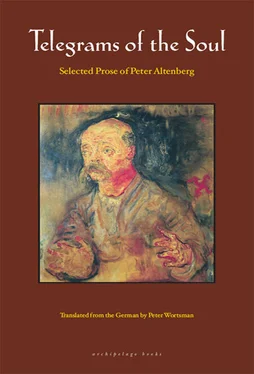The tutor stood back with the boy who wanted to move on: “A lioness, what’s the big deal?! She’s locked up—.”
The tutor just stood still.
“Fortunatina and the Lioness—,” he thought. He had no idea what it meant, what the story was all about. It was like a ballad which no poet had yet composed. The ballad was there ready to be born in the soul of a poet and set out into the world. Fully formed it fulminated in somebody’s head, pressing to see the light of day, wanting to burst into song — Fortunatina and the Lioness!
The tutor just stood still.
The little girl turned to him, blushed, grinned, all flustered, ready to move on.
“There’s no shame in dreaming yourself into the souls of animals,” thought the tutor. With an understanding smile he lay his wonderful fatherly hands on the shoulders of the child.
Fortunatina dreamed: “—suddenly, in the middle of the night a shriek resounds which, as it were, makes all of nature tremble—. A slash of the claw is just now felling an ox—. There are examples. Africa. Africa. Often in the last minute, cold-bloodedness, decisiveness served the sanguine hunter—.”
She peered at her tutor.
But the latter wore wide Pepita-pants, a dark jacket and a small brown felt hat. He also had a walking stick with a deer antler handle and a gold-rimmed pince-nez. He ought to have been standing there bedecked from head to toe in yellow rawhide! Or at least in spats!
They walked on.
You could hear the sound of iron castanets, muffled wooden drums, brass rings chiming.
They came to the dance ground of the Ashantee.
“Syncopated rhythms,” said the tutor, “do you hear it?! Tàd  t
t  dàd
dàd  d
d  dà t
dà t  dàd
dàd  —.”
—.”
“Just like the sound of a threshing machine,” said the boy.
“Quite right,” said the tutor, “syncopes.”
“It really does sound like a thresher,” said Fortunatina.
“Or like in a train car the sounds you hear rattling below,” said the boy.
“Just like in a train car,” said Fortunatina. “Somebody really ought to make a music of it with real instruments.”
“Bravo Fortunatina—,” said the tutor.
“It’s music for them in any case—,” said the boy.
“Don’t rush to make such a big distinction between us and them. For them, for them. What is that supposed to mean?! You think because stupid people set themselves above them, treat them like exotic animals?! Why?! Because their epidermis contains dark pigment cells?! These girls in any case are gentle and good. Come here, little one. How is your name?!”
“Tíoko—.”
He took the wondrous brown hand and laid it in Fortunatina’s hand. The latter became flustered.
Then he took a four-stranded necklace of white glass beads with a gold clasp out of his pocket and gave it to Tíoko.
“Where’d you get that?!” asked the boy, while the girl thought nothing of it.
“Where, wherever!” replied the tutor.
Later the boy said: “You were kind and gentle with Tíoko and you believe that she was the same with you; but it’s the opposite.”
The tutor peered at him, as if to say: “Stupid person, that’s the solution to the riddle of our muddled life.” But he said: “Fortunatina, wasn’t Tíoko gentle and sweet? You see! She came with us like a faithful companion, never let go of your hand. What pleasure she took in the glass pearls. And in everything else. Her cleanliness, her wonderfully smooth cool skin, her ivory white teeth, her gentle hands and feet, the aristocratic grace of her gait!”
The boy thought: “No matter what he says, he bought her.”
Fortunatina said in parting: “Tíoko, I love you.”
The boy thought: “Fortunatina makes a big deal out of everything.”
The tutor kissed Tíoko.
Fortunatina felt: “They’re all gentle,Tíoko, the poor lioness, my tutor. It’s just like in paradise, where people and wild animals—.”
The boy said: “How much did the glass beads cost? How did you come to have them on you? Go ahead, tell me.”
“How come, how come?! You have to open every person’s heart with the key that fits that lock.”
The boy thought: “Tíoko’s a funny one, that’s all.”
Fortunatina felt: “I want to cry, for Tíoko, for the lioness, for everything.”
At the zoo exit the aguti still sat there in their cage, the stupid people kept tossing in bread rolls and sugar cubes. In the light brown varnished little Swiss chalet sat the attendant, still selling lemon yellow entrance tickets and dark green reduced price tickets for groups, soldiers and regular visitors.
“Are you tired, Fortunatina?” asked the tutor.
“A little—.”
“Let’s sit down then—.”
There was a bench in a thicket of trees, surrounded by lawns planted with trees. They all felt the pleasant peacefulness, huddled together, as it were. The tutor took a four-stranded necklace of white glass beads with a gold clasp out of his pocket and lay it around Fortunatina’s neck.
She trembled with the joy of paradise.
No one said a word.
The boy was all flustered.
“You can smell the grass—,” said the tutor.
They all inhaled the pleasant scent which the earth exhaled from its wondrous lungs, actually from the pores of its skin.
“What will Tíoko do tonight?!” asked the girl.
“She cleans the clothes and shoes, makes the bed, fills the wash-basin with water for the zoo attendant you saw at the entrance.”
“I took her for the daughter of the king!”
The tutor kissed her gently on her blond head.
“I have a regal piece of jewelry on,” she felt, “like Lady Dudley, four strands of immaculate pearls, priceless, maybe worth four million—.”
The late afternoon earth-lawn gave of its steamlike, foglike freshness to the tired people seated on the hard wood bench, and to the couples in hidden corners of the park who longed for dark and silence. The thickets of trees stood like clouds over the firmament of the lawns. Tíoko trembled back in the zoo, draped the thin heliotrope-colored calico wrap over her wondrous brown breasts that ordinarily hung free and lovely as God made them, granting the noble eyes of men a picture of earthly perfection, an ideal of vitality and the blossoming of life.
Then she crouched on a little wooden stool and peeled potatoes for supper.
“What is Tíoko up to?!” thought the child on the bench.
The tutor held her white hand in his, his wonderful brotherly hands—.
“Allons—,” said the boy, “it’s awfully boring here and we’ll catch a cold. Fortunatina is bound to start sniffling soon.”
“Do me a favor, don’t worry about it, will you, please, if you please—,” said the tutor. They all went home ill at ease and in silence.
On the way, the little girl said to her tutor: “I could very well have caught a sniffle. Are you mad at Oscar?!”
“Dear one, sweet one—,” said the tutor and pressed her little hand to his heart.
__________________
*Sea swine, prevalent in South America
“It’s cold and very damp out, Tíoko. Rain puddles everywhere. Your people are naked. What are these thin linen things?! Your hands are cold, Tíoko. I’ll warm them for you. At least they could give you cotton flannel, not these threadbare linen rags.”
Читать дальше

 t
t 









